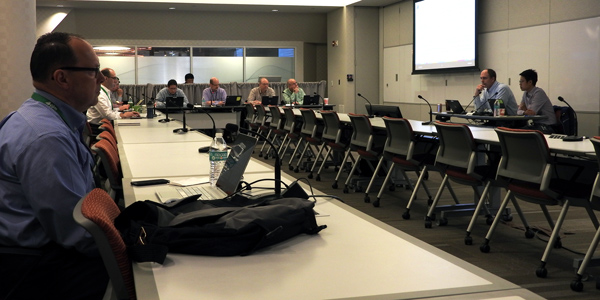By Rory D. Sweeney
VALLEY FORGE, Pa. — Although FERC has required almost all new generating units to provide primary frequency response, PJM stakeholders are strongly opposing any move by the RTO to require existing units to follow suit.
That disapproval became clear last week at a meeting of the Primary Frequency Response Senior Task Force (PFRSTF), during which staff reviewed the results of a nonbinding poll that revealed stakeholder support for the only PFR proposal that does not impose a mandate on units that don’t increase their output.
The proposal from American Electric Power (AEP) would apply PFR capability requirements on new units and existing units that modify their interconnection agreement to increase their output. Units that already provide PFR would be “encouraged to continue to do so” and can seek compensation at FERC. Units would annually confirm whether they will continue to provide the service, and PJM and transmission owners would revise system restoration plans accordingly.
A 10% dip in the system-wide aggregate PFR would trigger reconvening the task force “to analyze and suggest, if necessary, possible solutions.”
Stakeholders strongly opposed all three other proposals, two of which came from PJM and the third from the Independent Market Monitor. They all applied PFR capability on existing units but differed on minimum size or use thresholds and cost-recovery mechanisms.
“Part of the hang up we have with PJM’s initial proposal is the universal requirement for all. Where we get concerned is … if there’s compensation involved, we’ve got to foot the bill here,” explained Dave Mabry, who represents the PJM Industrial Customer Coalition (ICC). “I think the AEP proposal gets us a little bit closer to looking at: Does it make sense for a unit to have it?”
The PJM ICC believes existing units already have an avenue to be compensated for PFR costs through the capacity market, Mabry said, and would support provisions that develop a cost-benefit analysis for whether units should make those investments.
Carl Johnson, who represents the PJM Public Power Coalition, said he was “a little confused” by the lack of support for PJM’s “option B” proposal, which would require PFR only for units involved in system restoration plans and would offer them a one-time capital recovery method.
“On behalf of my members who both represent load but also self-serve load and have a lot of generation … we have concerns about anything that’s going to add costs for a service that we think maybe you should be providing anyway, but at the same time we have concerns about being audited and reported for failure to provide it, [including] the possibilities of selective enforcement. So, we’re of two minds on this,” he said. “I think we still need to work out a lot of issues with regard to what a broad requirement for PFR would be.”
GT Power Group’s David Pratzon and Tom Hyzinski voiced concerns about “retroactive ratemaking” and unfair demands on generators.
“If you take a look at those existing resources, a lot of them are resources that are financially challenged in the market right now. So, on one hand, to say they’re absolutely critical to the integrity of the system but then to turn a blind eye to the fact that they’re challenged in the market and to not make any attempt to compensate the vast majority of them for this critical value that they bring to the table” is unfair, Hyzinski said.
Package Criticism
PJM’s Glen Boyle said staff heard feedback that the proposals weren’t aligned with FERC Order 842, which some stakeholders believe specifically exempts existing resources from PFR requirements — the opposite of PJM’s interpretation. Stakeholders also said that exempting nuclear units — in harmony with the exemption of any new nuclear units in FERC’s order — was discriminatory.
The requirement would be an “unfunded mandate” and wouldn’t support capital cost recovery, stakeholders said. Calpine’s David “Scarp” Scarpignato agreed.
“If you have to go through a complex, very expensive, tedious process in order to get paid back for something, and there’s no kind of internal rate of return, I think some people might view those as unfunded,” he said.
Finally, RTO staff heard they did not satisfactorily make the case for the requirement, a criticism they attempted to address with presentations on a recent report from the Lawrence Berkeley National Laboratory and the importance of PFR in system restoration. PJM’s presentation detailed the many uses of PFR during such events, while the laboratory study emphasized the importance of having as many generators as possible provide the service.
Pratzon noted the possibility that some units may find it’s not worth the investment to provide PFR if they’re required to do so, weighed against a related concern that, without such a mandate, those who continue to provide PFR will be unfairly overcompensating for those who don’t.
“There are problems going down either direction,” he said.
Next Steps
Johnson noted that FERC is awaiting a report from NERC in July on the availability of existing facilities to provide PFR and suggested that discussions should continue but hinge on the report’s publication.
Scarp said he plans to offer an alternative package based on the feedback from the meeting.
PJM staff decided against moving for a binding vote until the group comes to a consensus or FERC responds to a request for rehearing of Order 842. The task force’s next meeting is May 23.




